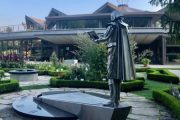In 1965, to weed out any opponents to UDI or to the government, the police stormed the campus, rounding up students considered to be political activists and confining them to house arrest in their distant homes on farms or in villages. I was horrified to hear that the leader of the Student Union had been sent to his African village, miles from anywhere. How was he meant to pursue his university studies in such a setting? This was his punishment for being a leader in a multiracial centre of learning. Then I learned that some of our European professors had been arrested, too, as terrorists. Was this possible? I don’t know what happened to them. Maybe they were deported. I can’t remember. But they disappeared, never to return.
What I recall most was the turmoil, the fear of what lay ahead, and my disbelief that this could be occurring at all. Finally, calm was forced upon the campus by a drastic measure. Without warning the government simply shut down the university. I remember making my way with a few friends to the dining room in my university residence, where we intended having lunch. However, this time, the swing doors were not bare. Instead, a piece of white paper had been taped to one of the doors, saying that as of 1pm that day (I don’t know what the date was), the university was “closed for the foreseeable future”, and that all students were required to vacate the premises immediately. Was this a joke? No, far from it. It was an official notification of closure, and we students couldn’t really understand why. We stood there staring at the paper, taking in all that it meant. How were we to continue our studies when the entire campus was off-limits to us? Such was the case, though.
So, I telephoned my parents from the public call box in our student residence, explained what had happened, and asked them to collect me from the university that same day. I packed up my books and my personal belongings, all the time wondering how long “a foreseeable future” would be. I went home, still shocked to think that we were now living in a country where political freedom and the concept of democracy no longer existed.
What could my family do to register our disapproval of what was happening in Rhodesia? Nothing much, for fear of repercussions. All that remained to us, as we saw it, was to sign monthly, the Visitors’ Book kept by the representative of the Queen, Governor-General Sir Humphrey Gibbs, whom the government no longer recognized. So, I often accompanied my mother to Government House to sign this book. By then, my mother had long since become a citizen of Rhodesia. My father, however, had declined to follow suit. Although he thus lost his right to vote, he maintained that he didn’t want to compromise his British status. As the head of our family, he wanted to guarantee that he could get us all back to Britain, if need be. I wasn’t eligible to vote until I was 21, but I did, indeed, do so as soon as I reached my age of majority.




